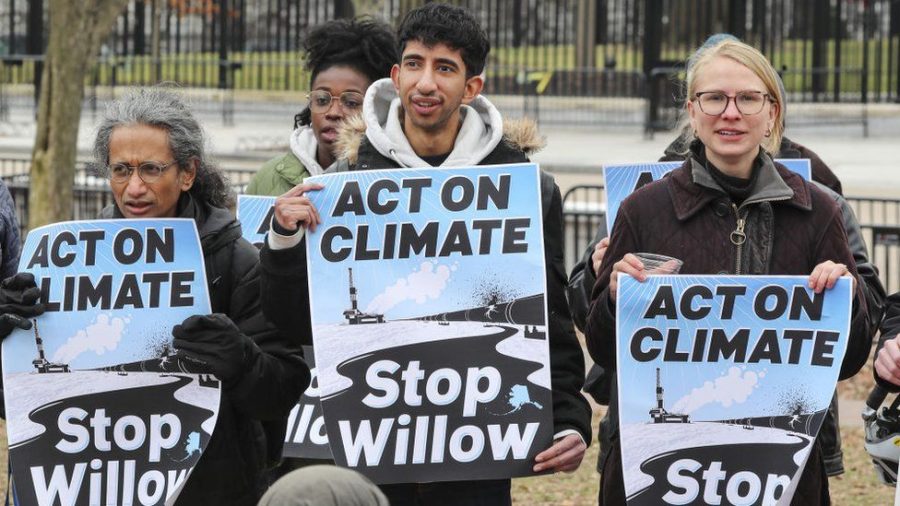Five years.
That number is displayed across cities like New York, Seoul and Glasgow for everyone to see the estimated time left before climate change impacts human society in a severe way.
“It seems to me that we are living in a time that many people have called ‘post normal,’ which essentially means that the world of the future is not going to look like the world of our childhoods,” Gerry Canavan, English professor and ecological humanities expert at Marquette University, said.
Canavan teaches an environmental protection class, where they learned from an article that Milwaukee will be a hot spot for the future, due to having the Great Lakes and surrounding farmland. He said the article tells Milwaukee to build homes for those who will be moving in the future as other areas become uninhabitable.
Canavan said the idea of the planet warming is a hard pill to swallow because even if we do achieve the ambitious goals of decarbonization, we will still be stuck in a world that will be much hotter and less habitable to civilization. Despite this, he said the first attempt should be a global political economic shift toward carbon neutrality and decarbonization.
Decarbonization is the process of reducing climate temperature and carbon dioxide and greenhouse gas emissions. In order for decarbonization to occur, there needs to be a significant reduction in the release of greenhouse gas emissions and carbon dioxide. Decarbonization is an attempt to mitigate the global temperature increase.
Heather Kohls, former Marquette environmental economist, said it’s important to remember it has only been 40 years since climate change has been even discussed.
“Gen X was the first group of kids that actually even had anybody mention that fact that you were supposed to be good to the environment unless you were a girl or boy scout,” Kohls said. “It’s becoming harder and harder for people to ignore climate change. That’s the first step: to believe there’s a problem. Then you have to have it hit you personally. And those two things coming together have people make change.”
Canavan said individual action won’t be as successful as society coming together to lessen the severity for upcoming generations.
“The problem with climate change is that the effects are baked in from decades before any of the alive generations, so the efforts to decarbonize are following the idea of minimizing future damage rather than reversing history,” Canavan said.
As far as action goes, Canavan said we can make different kinds of consumption choices, but the root of climate change is a structural problem.
“I’m kind of stuck with living a certain type of lifestyle because that’s the way we built the roads and things of that nature, so we really need to be thinking more systematically and that’s the problem,” Canavan said.
Canavan said the future is looking bleak and unstable if the government doesn’t change it’s spending habits. He said what society values, like modern technology, transportation and modern energy systems, is what people invest their money in.
“If you look at what our government values, we seem to value armies and prisons, and not valuing climate change. To me, the answer is to start spending money looking into the situation, trying to build sustainable energy systems, build sustainable transportation systems, do the research to try and figure out what is actually possible to change,” Caravan said.
According to the U.S Treasury, the government spends around 13% on the Department of Defense, which is military programs. This translates to $344 billion.
Kohls said to get people to care about protecting the environment, you need environmental change that impacts people’s checkbooks.
“One of my favorite analogies is when they first invented the tractor in 1907, farmers protested and made this whole thing about how it was going to destroy farming as we know it,” Kohls said. “They were just abusing the technology, and then we learned that it finally hit people to a point where farming prices are now skyrocketing cause farmers are leaving.”
Kohls said businesses can be a huge factor in mitigating environmental effects, such as businesses using money to buy carbon from the atmosphere. She said building demand is the fastest way to build supply, and that this mindset transfers into caring about the environment. Essentially, she said the power of the people is important in driving demand for environmental change and getting businesses to care.
“The danger of counting on you and I to do the change is that there’s always going to be people who aren’t reliable in the individual aspect,” Kohls said. “You and I as individuals are more powerful as investors demanding that the companies that we buy from or invest in do the right thing because that’s where the money is.”
Kohls said moving forward finding ways the average individual can contribute without hurting their financials is ideal.
“Climate change is the same kind of behavioral patterns that we have to learn to implement ourselves. It’s thinking about the garbage you make, about what you recycle. It’s thinking about what companies you invest in,” Kohls said. “If we can get our businesses to work together to find solutions to things, that would be the best scenario ever.”
For the planet’s future, Kohls said it depends on what technologies get invented and how businesses work with consumers.
“There is so much stuff out there that has huge potential, but nobody’s actually invested in it because there isn’t a demand for it. Years ago, they had these dryer balls that would actually make your clothes absorb the carbon dioxide you expel when you breathe,” Kohls said.
Kohls said driving demand for these types of environmentally sustainable products is a crucial puzzle piece.
A step in the right direction is that COP28, the oil and gas decarbonization charter, has an agreement to zero out methane emissions by 2030. 50 companies, including 30 nationally owned oil and gas companies, have signed up.
Kohls said if executed, these kinds of agreements driven by the private sector and by companies doing the right thing, are what can really put up a fight against climate change.
For those who are in denial of the results of climate change and the seriousness, Canavan points to some current events, such as Canada being on fire for months or the temperature being above 60 degrees in February.
The clock is ticking.
This story was written by Trinity Zapotocky. She can be reached at [email protected].










